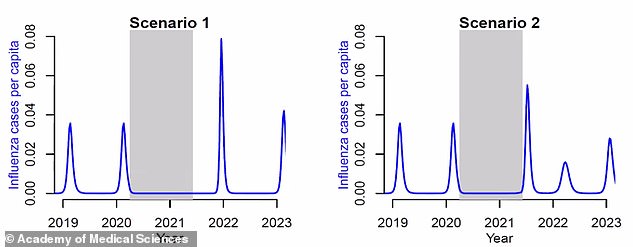The flu jab could be less effective than normal this winter because of the coronavirus pandemic, vaccine makers fear.
Every year a new influenza vaccine is developed to protect against several strains of the virus that have been circulating around the world.
But over the past year, surveillance of flu strains dropped to a fraction of normal levels as medical resources were turned over to monitoring Covid.
There has also been a lack of flu infections because of lockdowns worldwide, which has also reduced surveillance.
The effectiveness of flu vaccines varies from one season to the next but it is estimated at between 30 and 60 per cent.
It comes amid fears of a bad bout of influenza this year due to a lack of natural immunity caused by lockdowns.
Last September — five months before experts decide which strain to protect against — global genetic sequencing of flu had dropped by 94 per cent, according to jab makers.
And global shipments of influenza surveillance samples have dropped by 62 per cent compared to before the pandemic.
Dr Beverly Taylor, head of influenza and scientific affairs at Seqirus, which provides Britain with seasonal flu jabs, said: ‘We could have reduced the opportunity to identify viruses as they emerge.

Dr Beverly Taylor, head of influenza and scientific affairs at the company that provides Britain’s seasonal flu jabs, said: ‘We could have reduced the opportunity to identify viruses as they emerge. (stock image)

New variants of the flu virus emerge every year (pictured in a stock photo) which countries vaccinate against to ward off a bad flu season

The graphs above show what impact flu may have in England this year. The first shows what scientists think could happen if people in England still have some immunity from the flu, but natural waning is happening which makes more people susceptible to catch the flu over time. In this situation, transmission would likely take off in winter and infections and deaths would double compared to previous years. In scenario two, the scientists estimated that if flu immunity dropped in the population, the epidemic would most likely take off this summer, and around 1.5 times more people would die and go to hospital. A summer outbreak is less severe, because the R number is lower at this time of year, so despite more people being susceptible to infection due to a lack of immunity, less people would catch it
‘We certainly have reduced the opportunity to look at which viruses would give the best overall protection and the best coverage of all the circulating viruses.’
There are concerns the NHS could be overwhelmed this winter by a triple-whammy of surging flu and Covid admissions, and backlog patients needing treatment.
Experts also fear immunity to flu has waned over the year-and-a-half since the pandemic began because so few people have caught the virus.
Britain’s annual flu vaccination is normally based on the most dangerous strains in Australia and the southern hemisphere — which are in winter while the UK is in summer.
Who can get the flu jab this year?
More than 19million people were vaccinated against flu last year.
And the Department of Health aims to build on that record success this year by offering the jab to 35million Britons.
Health Secretary Sajid Javid said they aimed to build a ‘wall of protection’ around people.
From next month, it will be available to the following groups:
Over-50s;All children aged 2 and three;All primary and secondary school pupils;Clinically vulnerable people;Pregnant women;CarersImmunocompromised individuals close contacts;Health and social care staff.Advertisement
But travel restrictions and a lack of surveillance could have led to the most concerning strain of flu being missed.
The World Health Organization makes its recommendation about the flu strain to put in the UK’s jabs in late February.
Dr Taylor told The Telegraph: ‘We saw quite a big reduction in the labs supplying the genetic sequence data to the WHO, and around September last year, we saw a 94 per cent drop in genetic sequence data that was reported into the database.’
She warned that travel restrictions were also leading to ‘pockets’ of different influenza strains emerging across the world.
‘What we’re actually seeing is influenza in geographical pockets, so it’s very difficult for us to tell which one is going to be the winner,’ she said.
‘We could potentially see a mismatch for at least one of the subtypes. And so that’s cause for concern.’
She added: ‘This winter, it’s going to be over 18 months since most of us have seen influenza and there is concern that we’ll see a lower level of population immunity.’
Dr John McCauley, the director of the Worldwide Influenza Centre at the Francis Crick Institute, told MailOnline a lack of flu infections was also behind the reduced surveillance.
‘This will mean that somewhat fewer viruses will have been examined — since there will have been less influenza-like illness. Lots of tests for flu will have been negative.’
He added, however, that in recent months influenza surveillance has cranked back up to nearer normal levels.
‘My feeling from the World Health Organization is that the numbers are not now anywhere near so low. As I said, detections might be but tests are probably not so far off the numbers of a couple of years ago or so.’
Public Health England figures suggested that flu had almost completely disappeared at the start of this year, after it recorded virtually no cases up to February 14.
Experts pointed out that the data relied on swabs from just 25 trusts, and said it did not mean the virus was not still circulating in the community.
Estimates suggest up to 60,000 people could die from flu in England this winter because of waning immunity.
It is feared the nation will suffer one of the worst influenza outbreaks in decades due to Covid lockdowns causing a huge drop in immunity against other viruses.
A report by the Academy of Medical Sciences warned the flu death toll this year could be twice as bad as normal. The virus typically kills between 10 and 30,000 people every year.
The AMS report, which was commissioned by England’s chief scientific adviser Sir Patrick Vallance, called for ministers to start treating flu like Covid, saying usual death tolls from the seasonal virus are unacceptable.
The Department of Health is preparing to dish out the flu jab to 35million people this year, more than half the population, following the success of Covid vaccinations.
From next month, the flu jab will be offered to all primary and secondary school pupils up to year 11, the over-50s and people in ‘at risk’ groups.
Officials aim to build on the success of last year’s flu inoculation programme, which jabbed a record 19million people.
Health Secretary Sajid Javid said announcing the scheme last month: ‘Flu can be a serious illness and we want to build a wall of protection by immunising a record number of people.
‘The phenomenal scale of the Covid vaccination programme is a clear demonstration of the positive impact vaccination can make, and I want to encourage all those eligible to get their flu jab when called forward.’
It is supposed to run alongside a booster Covid vaccine programme, which will roll out third doses to vulnerable Britons.
Source link : https://www.dailymail.co.uk/news/article-9918327/Flu-jabs-weak-protect-people-winter-labs-focused-Covid-pandemic.html











